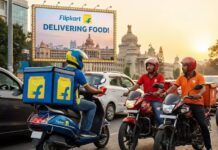Nestlé has committed to serving its employees with more climate-friendly foods through the Cool Food Pledge, a growing movement of workplaces, cities, hotels, hospitals, and restaurants aiming to cut food-related greenhouse gas emissions by 25% 2030.
With around 300 000 employees around the world, Nestlé serves an estimated 50 million meals a year at its sites. There is already an emphasis at the company on using local produce and increasing plant-based options.
Nestlé will deliver reductions in food-related greenhouse gas emissions through diversifying menus, raising employee awareness about food choices, and improving internal understanding of what ingredients to use in meals and snacks. The company will also work with suppliers and customers to encourage them to adopt such practices in their operations.
The pledge forms part of Nestlé’s broader commitment to achieving net-zero greenhouse gas emissions from farm to fork by 2050.
Groups serving 940 million meals annually have already signed on to this initiative, including BASF, Bloomberg, Cambridge University, the City of Milan, Harvard University, IKEA, Seattle Children’s Hospital, and the World Bank.
Preliminary data indicate that if current pledge signatories collectively hit the 25% reduction target by 2030, they will avoid more than 1 million tons CO2e of food-related GHG emissions annually, which is equivalent to taking more than 230,000 cars off the road.
IndiFoodBev — authentic, impactful and influential
An English-language food and beverage processing and packaging industry B2B platform in print and web, IndiFoodBev is in its third year of publication. It is said that the Indian food and beverage industries represent approximately US$ 900 billion in revenues which implies more than 20% of the country’s GDP. Eliminating the wastage on the farmside can help to deliver more protein to a higher number of the population apart from generating sizable exports. The savings in soil, seeds, water, fertilizer, energy and ultimately food and nutrition could be the most immense contribution that country is poised to make to the moderation of climate change.
To improve your marketing and grow sales to the food and beverage processing and packaging industry, talk to us. Our research and consulting company IppStar [www.ippstar.org] can assess your potential and addressable markets in light of the competition. We can discuss marketing, communication, and sales strategies for market entry and growth.
Suppliers and service providers with a strategy and budget for targeted marketing can discuss using our hybrid print, web, video, and social media channels to create brand recognition linked to market relevance. Our technical writers are ready to meet you and your customers for content.
The second largest producer of fruit and vegetables in the world is continuously expanding processing capacities and delivery systems with appropriate innovative technologies. We cover product and consumer trends, nutrition, processing, research, equipment and packaging from farm to thali. Get our 2025 media kit and recalibrate your role in this dynamic market. Enhance your visibility and relevance to existing markets and turn potential customers into conversations. Ask for a sample copy of our bi-monthly in print or our weekly IndiFoodBev eZine each Wednesday.
For editorial info@ippgroup.in — for advertisement ads1@ippgroup.in and for subscriptions subscription@ippgroup.in
Naresh Khanna – 10 February 2025
Subscribe Now











